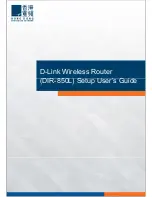
Local mesh
Local mesh profiles
7-14
Minimum SNR
(Alternate master or slave nodes)
This node will only connect with other nodes whose SNR is above this setting (in dB).
SNR cost per hop
(Alternate master or slave nodes)
This value is an estimate of the cost of a hop in terms of SNR. It indicates how much SNR
a node is willing to sacrifice to connect to node one hop closer to the root node, because
each hop has an impact on performance, especially when using a single radio.
Allowed downtime
The maximum time (in seconds) that a link can remain idle before the link actually gets
deleted. When a slave (or alternate master) looses its link to its master, the discovery
phase is re-initiated.
Maximum links
(Master or alternate master nodes only)
The maximum number of upstream and downstream links that this node can support.
Update mesh ID from server
(Master only)
When this option is enabled, every time the node restarts, it retrieves the configuration
file defined under
Scheduled operations
on the
Maintenance > Config file
management
page. If the retrieved configuration file is different from the current
configuration, the node loads the retrieved configuration.
Initial discovery time
(Alternate master or slave nodes)
Amount of time that will be taken to discover the best available master node. The goal of
this setting is to delay discovery until all the nodes in the surrounding area have had time
to startup, making the identification of the best master more accurate. If this period is too
short, a slave may connect to the first master it finds, not necessarily the best.
Maximum links
The maximum number of upstream and downstream links that this node can support.
Promiscuous mode
(Alternate master or slave nodes)
Although it could be used in other applications, the promiscuous mode is primarily
intended to solve issues specific to local mesh networks aboard trains. The main issue
that it addresses is train configuration changes. When a car is taken out for maintenance
and replaced with a new one, the AP in that new car will not be able to connect to the
train local mesh network because it is configured with a different mesh ID. This is where
the promiscuous mode comes into play. Its goal is to allow a node to connect to a
different mesh when it could not find any available master (alt-master) in its mesh for a
certain, configurable, amount of time.
Содержание E-MSM310
Страница 2: ......
Страница 3: ...HP MSM3xx MSM4xx Access Points Management and Configuration Guide ...
Страница 14: ...Contents xii ...
Страница 26: ...Introduction Online documentation 1 12 ...
Страница 51: ...Wireless configuration Radio configuration 3 9 E MSM460 and E MSM430 ...
Страница 52: ...Wireless configuration Radio configuration 3 10 MSM422 ...
Страница 53: ...Wireless configuration Radio configuration 3 11 MSM410 ...
Страница 54: ...Wireless configuration Radio configuration 3 12 MSM335 radio 1 and 2 ...
Страница 55: ...Wireless configuration Radio configuration 3 13 MSM335 radio 3 ...
Страница 56: ...Wireless configuration Radio configuration 3 14 MSM320 ...
Страница 57: ...Wireless configuration Radio configuration 3 15 MSM310 ...
Страница 112: ...Working with VSCs Quality of service QoS 4 28 ...
Страница 134: ...Network configuration 802 1X supplicant 5 22 ...
Страница 196: ...Regulatory information B 16 ...
Страница 208: ...Resetting to factory defaults Factory defaulting ruggedized products D 6 ...
Страница 209: ......
















































